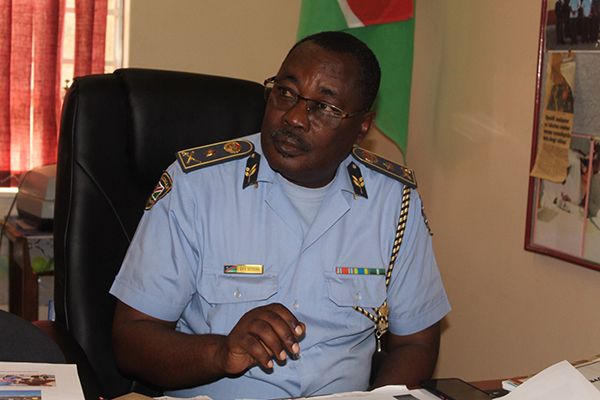Edward Mumbuu
Between 2016 and now, the police in the Kunene region recorded 11 936 criminal cases across all 16 stations. The cases include murder, rape, stock theft and domestic violence, official statistics reveal.
The region has around 100 000 inhabitants, while its landmass is 115 293 square kilometres. What is apparent, statistics reviewed by New Era show, is that the town of Outjo appears to be a hot spot for criminals, as at least 40% of the total regional crimes are committed in and around the town.
Last year, alone, Outjo recorded 891 cases. They are followed by Opuwo (488) and Khorixas (380).
“Like now, we focus more on Outjo in order to try to reduce crime in our region… we have managed to put more men and women in uniform on patrol; police visibility is everywhere in the towns like Outjo, Khorixas, Opuwo and Kamanjab. That’s why the crime rate is going down,” said police chief in the region James Karungoojo Nderura.
In 2016, 1 573 criminal cases were registered by the police in the region. The following year, the figure reduced to 1 516, while 1 503 cases were reported in 2018.
Meanwhile, 2019 saw a sharp decrease after only 1 205 cases were reported to the police. The figure would see a 73% increase in 2020, as the police recorded 2 095 cases.
What is more, 2 274 criminal cases were opened in 2021, while 2 399 were recorded last year. So far, this year, 576 cases have been opened with the police in the region.
Zeroing into 2022, 243 assault cases were recorded. A further 271 cases of housebreaking and theft were opened, while 261 cases of theft and 254 cases of stock theft were opened, respectively.
There were 10 cases of murder, 103 domestic violence, drug possession (99) and 26 inquests (unnatural deaths). Nderura registered his concerns about crime prevention in the region during a recent interview with this paper.
According to him, stock theft, domestic violence and rape cases continue to be a thorn in the flesh of the law enforcement agency.
Nderura also registered his disappointment in community members who withdraw cases after reconciling with perpetrators.
“It is very much concerning because we use resources for us to go out and try to prevent these [crimes]. At the end of the day, after they withdraw the cases, if anything happens to them after the withdrawal, the blame comes to the police that ‘we used to report these cases’. But they forget that it’s the public themselves who used to come and withdraw these cases,” Nderura said.
What is more, the poor road infrastructure and network connectivity in the region hamper police efforts to combat crime.
To date, there is only one tarred road in the northern part of the region. It is the road that connects Kamanjab to Opuwo, stretching around 260 kilometres.
“All stakeholders, including the Roads Authority, the regional council, our constituency councillors and the governor are aware of poor road infrastructure in the region. Each year, we drive together during our regional crime operation,” he said.
The fact that there is no gazetted border post between Kunene and Angola has exposed Kunene to cross-border criminal activities, particularly drug trafficking and stock theft, Nderura noted.
“Most of the drugs are coming from our neighbouring country, Angola, because we don’t have any gazetted border posts between Angola and Kunene, and people just cross the river when the water is shallow, especially during the drought,” he said.
Additionally, he said, the police have also been inundated with land disputes between recognised and unrecognised traditional authorities and leaders, as well as conservancies in the region.
According to Nderura, conservancies in the region have taken matters into their own hands by making themselves custodians of the land, which he said is a role the law reserves for traditional leaders.
– emumbuu@nepc.com.na


